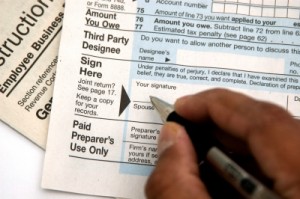Federal income tax filing: 5 common mistakes -- and what they can cost you
Published 2/5/11 (Modified 3/22/11)  By Peter Andrew
By Peter Andrew
Long before he became a cop, Kevin was my best friend. So when he joined the police, it seemed natural that I'd often join him and his colleagues for an after-work drink. They were a great bunch, and I really enjoyed the time I spent with them. But as they told their job-related stories, I'd frequently think to myself how much I enjoyed being their friend, and how little I'd like to meet them professionally.
I don't know any IRS agents, but I suspect that the same would apply. They're probably charming people socially, but you really, really don't want to spend time with them when they're working.
Luckily, there are simple things you can do when filing your federal income tax return that can help you avoid finding out whether I'm right.
Beware of these 5 common mistakes to avoid Tax Trouble
Here are five common mistakes routinely made on taxes, and how they can be avoided:
- You didn't double check
Among the most common federal income tax filing mistakes are some that are so embarrassingly elementary that you wouldn't want to admit to them outside a confessional. So, before mailing your return, ask yourself these three questions:
- Have I signed and dated the form?
- Have I entered and triple-checked my social security number?
- Have I attached Copy B of the W-2 form(s) my employer(s) sent me?
- You got the math wrong
According to the IRS, the most common mistake of all is people making basic errors in their arithmetic. You can